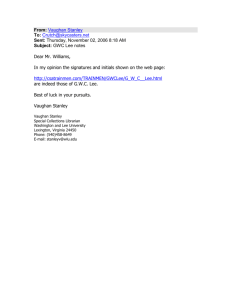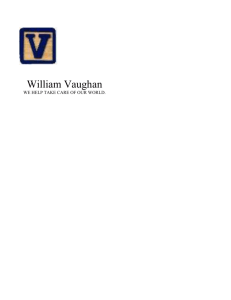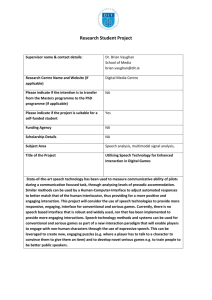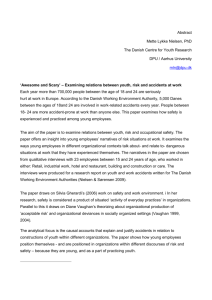Douglas F. Vaughan Indicted in “Ponzi” Scheme
advertisement
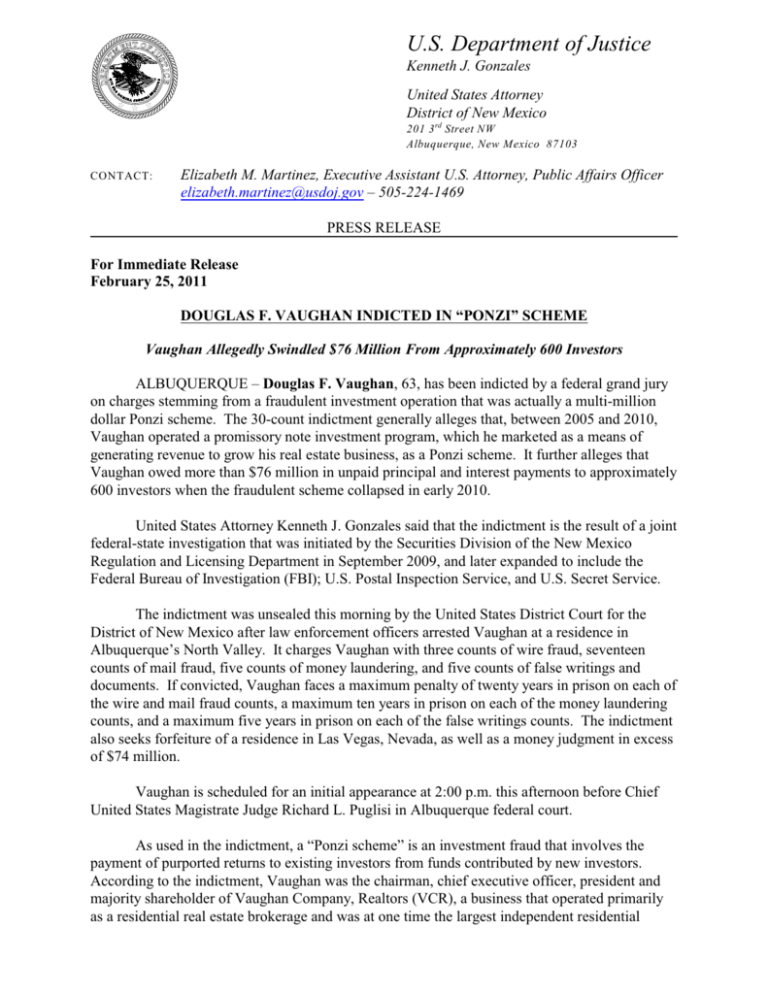
U.S. Department of Justice Kenneth J. Gonzales United States Attorney District of New Mexico 201 3 rd Street NW Albuquerque, New Mexico 87103 CONTACT: Elizabeth M. Martinez, Executive Assistant U.S. Attorney, Public Affairs Officer elizabeth.martinez@usdoj.gov – 505-224-1469 PRESS RELEASE For Immediate Release February 25, 2011 DOUGLAS F. VAUGHAN INDICTED IN “PONZI” SCHEME Vaughan Allegedly Swindled $76 Million From Approximately 600 Investors ALBUQUERQUE – Douglas F. Vaughan, 63, has been indicted by a federal grand jury on charges stemming from a fraudulent investment operation that was actually a multi-million dollar Ponzi scheme. The 30-count indictment generally alleges that, between 2005 and 2010, Vaughan operated a promissory note investment program, which he marketed as a means of generating revenue to grow his real estate business, as a Ponzi scheme. It further alleges that Vaughan owed more than $76 million in unpaid principal and interest payments to approximately 600 investors when the fraudulent scheme collapsed in early 2010. United States Attorney Kenneth J. Gonzales said that the indictment is the result of a joint federal-state investigation that was initiated by the Securities Division of the New Mexico Regulation and Licensing Department in September 2009, and later expanded to include the Federal Bureau of Investigation (FBI); U.S. Postal Inspection Service, and U.S. Secret Service. The indictment was unsealed this morning by the United States District Court for the District of New Mexico after law enforcement officers arrested Vaughan at a residence in Albuquerque’s North Valley. It charges Vaughan with three counts of wire fraud, seventeen counts of mail fraud, five counts of money laundering, and five counts of false writings and documents. If convicted, Vaughan faces a maximum penalty of twenty years in prison on each of the wire and mail fraud counts, a maximum ten years in prison on each of the money laundering counts, and a maximum five years in prison on each of the false writings counts. The indictment also seeks forfeiture of a residence in Las Vegas, Nevada, as well as a money judgment in excess of $74 million. Vaughan is scheduled for an initial appearance at 2:00 p.m. this afternoon before Chief United States Magistrate Judge Richard L. Puglisi in Albuquerque federal court. As used in the indictment, a “Ponzi scheme” is an investment fraud that involves the payment of purported returns to existing investors from funds contributed by new investors. According to the indictment, Vaughan was the chairman, chief executive officer, president and majority shareholder of Vaughan Company, Realtors (VCR), a business that operated primarily as a residential real estate brokerage and was at one time the largest independent residential brokerage in New Mexico. In spring 1993, Vaughan allegedly began a promissory note investment program (Promissory Note Program) to generate revenue to grow VCR’s business. The typical note had a three-year term, an interest rate ranging from 8% to 40% per year, and provided for interest to be paid in monthly installments. At the end of the note’s term, Vaughan either paid off the principal or offered the investor the opportunity to “roll over” the principal into a new note. Vaughan allegedly signed each promissory note on behalf of VCR. The indictment alleges that Vaughan led investors to believe that their investments in the Promissory Note Program were actually or virtually risk-free because they were guaranteed by VCR, Vaughan’s personal guarantee, and a $2.5 million deed of trust on certain real estate. Vaughan allegedly marketed his Promissory Note Program by representing that the invested funds would be used to purchase real estate and to acquire smaller real estate companies. Instead, Vaughan used the Promissory Note Program funds primarily for three undisclosed purposes: (i) to pay the interest and principal on promissory notes taken out by earlier investors; (ii) to pay himself, under the guise of salary, bonuses, or some other personal transfers; and (iii) to subsidize the operation of VCR, which was generating insufficient “legitimate” revenues to sustain itself. According to the indictment, by 2005, the Promissory Note Program was the primary source of revenue for VCR and, without the infusion of capital generated by new Promissory Note Program investors, VCR was insolvent. Despite this, Vaughan allegedly continued to distribute the same marketing materials for the Promissory Note Program, sign the same promissory notes, and make the same corporate and personal guarantees. Although Vaughan represented to investors that he would not extend more than $2,500,000.00 in promissory notes, financial records allegedly reflect that the aggregate principal balance owed to note holders far exceeded this amount: 2004 2005 2006 2007 2008 2009 – – – – – – $24,351,605.00 $32,299,363.37 $39,969,110.68 $49,984,845.80 $62,844,445.57 $74,386,623.38. From at least 2005 through February 2010, Vaughan allegedly used funds from new Promissory Note Program investors to make interest payments to existing note holders and thus lulled existing investors into believing that they were being paid returns from VCR’s legitimate business revenues. However, VCR’s corporate tax returns reflected the following annual losses: 2004 2005 2006 2007 2008 2009 – – – – – – $4,041,048.00 $5,595,285.00 $7,461,409.00 $9,913,893.00 $13,313,323.00 $13,907,738.00 –2– As alleged in the indictment, when his Ponzi scheme began to collapse and he became unable to meet the monthly interest payments to note holders, Vaughan made false and misleading excuses to investors and failed to disclose that VCR had insufficient revenue to make the interest payments. In February 2010, when Vaughan filed for personal and corporate bankruptcy, the aggregate principal balance owned to approximately 600 note holders was approximately $74,745,723.93 and the interest expense owed to note holders exceeded $1 million per month. In announcing the indictment, United States Attorney Gonzales said, “The case against Vaughan is fundamentally about deceit. Vaughan allegedly misrepresented to investors their guaranteed rate of return, the safety of their investments, and even what it was they were investing in. People who trusted Vaughan ended up losing a lot of money, in some cases, their life savings. My office will diligently and aggressively prosecute Vaughan and others like him who seek to defraud people out of their hard earned money. I commend the Securities Division of the New Mexico Regulation and Licensing Department, the FBI, the Postal Inspection Service and the Secret Service for the persistent and thorough investigation that led to this significant indictment, and their ongoing efforts to protect the public by detecting and stopping these fraudulent investment schemes.” Carol K.O. Lee, Special Agent in Charge, Albuquerque Division of the FBI said, “I would like to commend the work of all the investigators and the FBI agents involved in this case for making today's indictment possible. The FBI is committed to vigorously investigating Ponzi schemes and other types of investment frauds. Besides inflicting serious economic harm on individual victims, these crimes also undermine confidence in our financial markets.” “Utilizing its specialized expertise and experience, the securities division fights fraudsters across the state of New Mexico every day, by investigating and prosecuting,” said New Mexico Regulation and Licensing Superintendent J. Dee Dennis Jr. “By perpetrating an alleged $76 million dollar fraud, Doug Vaughan has the dubious distinction of being the largest alleged Madoff-like Ponzi schemer in New Mexico history. Our highly dedicated staff will continue to regulate the securities industry, educate the public, and enforce the law to protect the investing public from financial predators,” said Dennis. “Doug Vaughan's arrest brings to a close a Ponzi scam that financially devastated as many as 600 victims, many of them New Mexico residents,” said Fort Worth Division Inspector in Charge Randall C. Till. “Consumers have the right to receive mail free of fraudulent promises and deliberate misrepresentations. Before even Charles Ponzi gave the scam its name in the early 20th century, Postal Inspectors vigorously investigated these types of frauds and remain committed to defending innocent consumers against those who would abuse the U.S. Mails to further their criminal enterprises." “Cooperation and partnerships among federal and state investigators, allows us to combine not only our resources, but also our expertise, to combat fraudulent investment Ponzi schemes,” Richard Ferretti, Resident Agent in Charge, Albuquerque Resident Office of the U.S. Secret Service commented. –3– United States Attorney Gonzales has assigned Assistant United States Attorney Gregory J. Fouratt to prosecute the case. An indictment contains only charges and is not evidence of guilt, and the defendant is presumed innocent unless and until proven guilty. This case was brought in coordination with the President’s Financial Fraud Enforcement Task Force, which includes representatives from a broad range of federal agencies, regulatory authorities, inspectors general, and state and local law enforcement who, working together, bring to bear a powerful array of criminal and civil enforcement resources. The task force is working to improve efforts across the federal executive branch, and with state and local partners, to investigate and prosecute significant financial crimes, ensure just and effective punishment for those who perpetrate financial crimes, combat discrimination in the lending and financial markets and recover proceeds for victims of financial crimes. The task force is also making the public aware of resources available to protect against these types of fraud and how to report fraud when it occurs. To learn more about investment scams, how to take steps to protect yourself from scams or how to report investment fraud if you believe you have been victimized, the task force recommends that you visit its website, www.StopFraud.gov. ### 11-094 –4–
